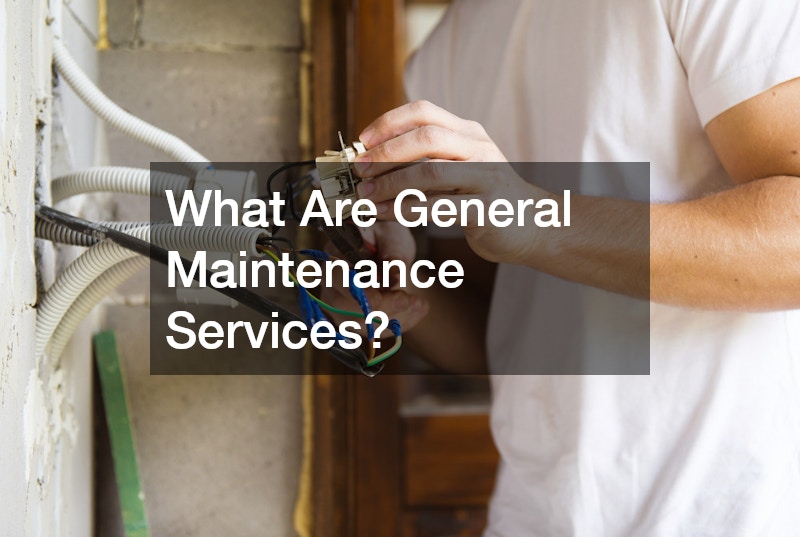In today’s fast-paced commercial world, maintaining a reliable and efficient business operation requires more than just offering great products or services. The backbone of any successful operation lies in well-maintained infrastructure, safety compliance, and operational continuity. This is where general maintenance services become crucial. Whether your business requires HVAC inspections, fire protection service evaluations, or the upkeep of outdoor areas with commercial mowers, dependable maintenance ensures business continuity. This guide explores how to find trustworthy general maintenance services tailored to your specific needs while safeguarding your assets and enhancing your company’s long-term value.
What Are General Maintenance Services?

Definition and Scope
General maintenance services are a collection of ongoing tasks performed to preserve the operational integrity of a business’s infrastructure. These services range from routine cleaning and minor repairs to more technical upkeep like local generator services and electrical system maintenance. They also extend to the exterior, covering areas such as commercial fencing, landscaping, and roofing.
Types of Services Offered
Maintenance providers often offer a variety of services including electrical checks, plumbing repairs, HVAC maintenance, roofing inspections, and fire extinguisher inspections. More specialized services, like working with local commercial roofers or propane service technicians, are sometimes incorporated under a broader general maintenance contract. Many companies also include asset management, which might involve maintaining office seating for ergonomic compliance or ensuring secure storage solutions.
Importance for Businesses
Consistent general maintenance ensures smooth daily operations, reduces the risk of sudden equipment failures, and maintains a safe and comfortable environment for employees and clients. Well-maintained buildings and systems also support a business’s professional image and play a role in boosting real estate value, especially in commercial settings where property presentation directly affects marketability.
Differences Between General and Specialized Maintenance
General maintenance typically refers to routine or basic upkeep that applies across multiple systems or building features. In contrast, specialized maintenance requires more technical expertise—like engaging business security guards to handle surveillance systems or fire protection service teams to manage sprinkler systems. Businesses often rely on both to ensure full operational coverage.
How These Services Benefit Business Operations
General maintenance helps minimize downtime, enhance safety, and maintain regulatory compliance. When combined with efficient tools like commercial mowers for outdoor upkeep or proper storage and care for fire extinguishers, these services contribute to a business’s credibility and efficiency. More importantly, having reliable service providers readily available means less time lost sourcing help when emergencies arise.
Why Is It Important to Choose Reputable Maintenance Services?
Ensuring Quality Workmanship
Hiring reputable maintenance providers ensures work is done correctly the first time. Quality workmanship from experienced contractors—whether they’re handling your commercial fencing or maintaining office seating—can significantly extend the life of your assets and reduce recurring repair costs.
Reliability and Timeliness
Trustworthy maintenance providers understand the importance of timely responses. Whether it’s a broken HVAC unit in the summer or an urgent need for local generator services during a power outage, fast and reliable service keeps your operations running smoothly and avoids productivity loss.
Cost Efficiency in the Long Run
Though reputable services may sometimes come with higher upfront costs, they often result in savings by reducing the need for repeated repairs. For example, using reliable local commercial roofers helps avoid costly structural damages caused by poor-quality roofing work. Long-term contracts with dependable vendors can also lock in favorable pricing.
Maintaining Safety Standards
A key function of general maintenance is to keep your business safe. Regular inspections by a fire protection service ensure systems are functional and compliant with safety regulations. Ensuring your facility is equipped with working fire extinguishers and serviced gas lines by a propane service provider is critical for safety and liability prevention.
Protecting Business Assets and Reputation
Neglected maintenance issues can tarnish your brand’s image and cause asset depreciation. Customers and clients notice when a facility is poorly maintained. Engaging in routine upkeep, from commercial mowers keeping landscapes neat to secure commercial fencing installations, communicates professionalism and care for every detail.
How to Assess the Credibility of Maintenance Service Providers

Checking Licenses and Certifications
Start by ensuring the provider holds all necessary licenses and industry certifications. Providers offering specialized services, such as fire protection service or local generator services, must meet specific regulatory requirements to operate legally and safely.
Reviewing Customer Testimonials and Feedback
Online reviews, testimonials, and business references offer valuable insight into a provider’s reputation. Look for feedback on response time, service quality, and professionalism—especially from similar industries or businesses of similar size and scope.
Evaluating Past Work Portfolio
Reputable providers will often share case studies or project portfolios. This transparency helps you gauge whether their experience aligns with your needs. For instance, if your facility includes expansive grounds, check for experience with commercial mowers and outdoor maintenance.
Importance of Insurance and Guarantees
General liability insurance and service guarantees protect your business in case of damages or incomplete work. This is especially vital when dealing with expensive equipment, high-risk services like propane service, or tasks involving external contractors.
Trust Signals in Service Agreements
Clarity in contracts signals professionalism. Look for detailed service agreements that outline scope, pricing, deadlines, and liability terms. This reduces ambiguity and helps avoid disputes later.
What Are the Key Factors to Consider When Hiring a Service Provider?
Understanding Service Provider Expertise
Not all providers have the same skill sets. A vendor with expertise in fire extinguisher inspections may not be ideal for complex HVAC systems. Determine your priorities and match them with provider capabilities, whether it’s office seating arrangements, commercial fencing repair, or local commercial roofers for regular inspections.
Budget Constraints and Pricing Models
Service costs can vary widely depending on the complexity and frequency of maintenance required. Reputable companies provide flexible pricing models, allowing businesses to choose between fixed-rate contracts or pay-as-you-go structures.
Accessibility and Communication
Prompt communication and availability are essential. A service provider should offer reliable customer support, easy appointment scheduling, and a responsive team for emergencies.
Customization of Services to Fit Business Needs
Each business has unique operational needs. Maintenance providers must be able to adapt—offering seasonal propane service during peak demand or scalable real estate support services if you operate across multiple properties.
Post-Service Support and Follow-up
Quality maintenance doesn’t end when the job is done. The best providers offer follow-up visits, performance tracking, and documentation. Whether it’s confirming fire protection service compliance or following up on commercial mower repairs, ongoing support is a hallmark of reputable services.
How to Ensure Services Meet Industry Standards?

Familiarity with Industry Regulations
Compliance with OSHA standards, fire codes, and environmental regulations is non-negotiable. Choose providers who stay updated on all industry-specific rules, especially if you’re dealing with specialized services like fire extinguisher inspections or propane line maintenance.
Regular Audits and Evaluations
Routine assessments by internal teams or third-party auditors ensure ongoing compliance and identify areas for improvement. Maintenance checklists and reporting protocols keep providers accountable.
Staff Training and Certification
A well-trained staff ensures safe and efficient service delivery. Ask about technician credentials and ongoing education programs, particularly for technical services like local generator services or fire suppression systems.
Implementation of Standard Operating Procedures
Standardized workflows minimize errors and streamline service delivery. Providers who follow documented SOPs offer consistency, especially when operating across multiple business locations.
Adapting to Technological Advancements
Modern maintenance increasingly relies on technology, from digital scheduling platforms to smart sensors for predictive maintenance. Technologically capable providers can better manage complex systems, increase transparency, and reduce response times.
What Are the Common Challenges in Hiring Maintenance Services?
Navigating the Market for Suitable Providers
The abundance of options can be overwhelming. Narrow your choices by clearly defining your needs—whether it’s regular landscape care with commercial mowers or ensuring your business security guards have reliable backup systems through local generator services.
Managing High Costs and Budget Constraints
Maintenance expenses can add up. Strategic budgeting, prioritizing critical services, and negotiating service contracts help manage costs. Bundling services like commercial fencing repair with general maintenance can also yield discounts.
Avoiding Service Downtime
Scheduling maintenance without interrupting business operations is a challenge. Seek providers who offer off-hour or weekend services, particularly for time-sensitive tasks like roofing inspections or HVAC servicing.
Ensuring Service Responsiveness
Delayed service can lead to bigger issues. Confirm provider response time for emergencies, especially for critical systems like fire protection service or propane line failures.
Handling Contractual Disputes
Clear, legally sound contracts help avoid disagreements. Engage legal counsel if needed to review terms—particularly for high-liability areas like fire extinguisher servicing or local generator installations.
How Can Technology Aid in General Maintenance?
Integrating Maintenance Management Software
Digital platforms enable scheduling, tracking, and reporting maintenance tasks efficiently. These systems ensure no task is overlooked—from managing real estate HVAC checks to tracking commercial mower usage hours.
Benefits of Predictive Maintenance
Sensors and monitoring devices identify issues before they escalate, reducing unplanned downtime. Predictive tools can be applied to systems like propane tanks or generators to anticipate failures and streamline interventions.
Utilizing IoT Devices for Monitoring
Smart devices can monitor lighting, HVAC systems, and even fire protection service status in real time. This enhances accuracy, allows remote troubleshooting, and improves preventative care.
Data Analytics for Optimizing Service Delivery
Analyzing maintenance data identifies trends and inefficiencies. This insight supports better decision-making, improves service timelines, and optimizes vendor performance evaluations.
Ensuring Digital Communication Between Teams
Digital platforms facilitate better communication between internal staff and external service providers. Updates, images, and logs can be shared instantly, making coordination smoother for tasks like commercial fencing repairs or fire extinguisher replacements.
What Are Some Cost-Effective Maintenance Strategies?
Preventive vs. Reactive Maintenance
Preventive maintenance is almost always more cost-effective. Regular checkups on systems like office seating ergonomics or propane tanks can avoid costly reactive repairs and extend asset life.
Resource Allocation and Scheduling
Organized scheduling minimizes disruptions and ensures efficient resource use. Prioritize services with long lead times, like local commercial roofers or seasonal fire protection service inspections.
Vendor Management and Negotiation
Working with a smaller number of trusted vendors allows for better pricing and relationship management. You may secure bundled rates for multiple services, such as commercial fencing, landscape upkeep with commercial mowers, and roofing maintenance.
Streamlining Procedures and Reducing Waste
Efficient maintenance operations reduce time, costs, and materials. Implementing lean strategies, recycling old parts, or training staff to perform basic fire extinguisher checks are examples of resource optimization.
Training In-House Staff for Simple Repairs
Educating staff to handle minor issues—like replacing light fixtures or reassembling office seating—can reduce dependency on outsourced services, saving time and money.
How to Develop a Long-Term Maintenance Plan?

Establishing Maintenance Goals and Objectives
Clearly outline what you want your maintenance strategy to achieve. Whether it’s improving safety through consistent fire protection service or maintaining real estate value, clear goals guide the planning process.
Creating a Comprehensive Timeline
Schedule both short-term tasks and long-range initiatives. Seasonal propane service, yearly roofing inspections, and quarterly commercial mower servicing should all be plotted for smooth execution.
Systematic Review and Adjustments
Regularly evaluate what’s working and what isn’t. If your current commercial fencing vendor underperforms, make timely changes based on performance data and user feedback.
Budget Forecasting and Financial Planning
Incorporate anticipated maintenance needs into your financial planning. Forecast for unexpected expenses like generator replacements or new office seating installations to avoid budget strain.
Developing Risk Management Measures
Plan for emergencies with backup vendors and response protocols. Secure fire protection service records, generator backups, and real estate insurance coverage as part of a comprehensive risk strategy.
What Legal Considerations Exist in Hiring Maintenance Services?
Understanding Contractual Obligations
Ensure contracts clearly define responsibilities, timelines, penalties, and scope of work. Ambiguity can lead to legal issues, especially in services with liability concerns like propane or fire extinguisher maintenance.
Liability and Assurance Policies
Confirm that the provider’s liability coverage aligns with your risk level. This is especially vital for high-risk operations like commercial roofing or security systems managed by business security guards.
Compliance with Labor Laws
Ensure that all service personnel, whether managing commercial mowers or installing office seating, are legally employed and meet local labor law requirements to avoid compliance issues.
Ensuring Data Privacy and Security
Vendors accessing sensitive areas must adhere to your data security protocols. This is particularly important when service providers interface with your IT infrastructure or business security guards’ monitoring systems.
Intellectual Property Rights and Agreements
For custom-built systems or software integrations related to maintenance, clearly define IP ownership and usage rights. This is especially relevant if the provider develops digital solutions for maintenance tracking.
Final Thoughts
Choosing reputable general maintenance services is vital for every aspect of business performance—safety, efficiency, cost control, and reputation. By understanding your needs, conducting diligent assessments, and integrating technology, you can ensure consistent, high-quality maintenance across all facilities. Whether it’s regular fire extinguisher servicing, commercial mower upkeep, or working with experienced local commercial roofers, these services support long-term operational success and resilience in today’s evolving business landscape.
